“Profit and Loss”
Written by Flip Kobler & Cindy Marcus
Directed by Robert Wiemer
Season 2, Episode 18
Production episode 40512-438
Original air date: March 20, 1994
Stardate: unknown
Station log: A damaged Cardassian shuttle is approaching the station. Sisko has it towed to a cargo bay, where the passengers introduce themselves as Professor Natima Lang and her students, Rekelen and Hogue. She says she was caught in a meteor shower. While O’Brien starts on repairs, Lang and her students go to the Promenade, where Quark is overjoyed to see her. She isn’t so much: she backhands him, tells him she told him never to speak to her again, and stomps off. Quark, however, declares it to be the happiest day of his life.
Bashir and Garak are chatting in Quark’s on the subject of loyalty to the state vs. loyalty to one’s self, one’s friends, and one’s family—Garak chooses the former, Bashir the latter.
Quark all but forces Lang and her students into the bar and he buys her a drink. While fixing the drink, Quark explains to Odo that she used to be a journalist on the station before Odo’s time, and that he was the love of her life. Lang allows herself to be alone with Quark, sending the students to the bar, but their reunion is not entirely pleasant, despite Quark’s best efforts.
When Garak leaves the bar, Lang and the students become apprehensive, as they thought there were no Cardassians on the station, and they leave the bar in a hurry. It’s a sign of how frightened Lang is that she actually is nice to Quark as they leave.
O’Brien reports to Sisko that they weren’t in a meteor storm, they were fired upon by Cardassian disruptor fire. Lang admits to it without argument when Sisko confronts her, and pleads with him to let them go—if the Cardassians capture her students, they’ll be killed. Rekelen and Hogue are leaders of a Cardassian dissident movement, and they’ve already been targeted once. Sisko agrees to assign them guest quarters and expedite repairs.
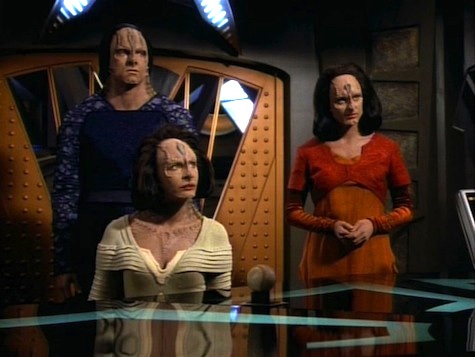
Quark visits Garak in his shop, ostensibly to buy a dress for Lang, but their conversation about fashion has an obvious undertone, in which Garak makes it clear that standing too close to Lang and her students might be very dangerous.
Then Quark takes another shot at making up with Lang, and we find out that she saved his life from being executed for selling food to Bajorans, and he turned around and used her access code to embezzle from the Cardassian Information Service. Quark offers to help her in exchange for her staying with him—because if she doesn’t stay, he’ll follow her. She points out that following her will get him killed, but he says he doesn’t care. She doesn’t believe him, and is convinced that his nature will take over eventually. She also insists that she doesn’t love him, but he doesn’t believe her.
A Cardassian warship shows up in a defensive posture, and Garak arrives in Ops to speak on their behalf. Cardassian Central Command wishes to bring Hogue and Rekelan home, but Sisko is not about to turn political refugees over.
Having failed to convince Lang, Quark works on the students, convincing them that he can get them away from the station safely. He has come into possession of a battered old cloaking device that’ll only work for about fifteen minutes or so, but he’ll give it to Hogue and Rekelen—if they can convince Lang to stay. But she refuses to stay with him and insists that he give her the cloaking device, going so far as to point a weapon at him. Quark is convinced she won’t shoot him, which he believes right up to the moment when she shoots him.
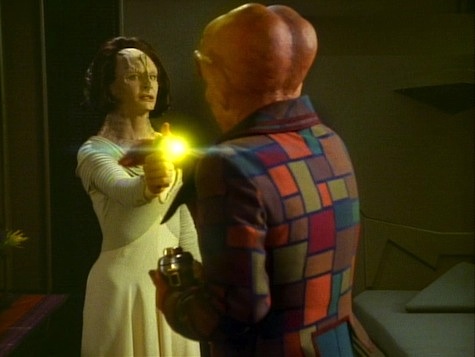
But it turns out that Quark was right, she didn’t mean to shoot; she hit the trigger by mistake. She also finally admits that she loves him and always did, even when she hated him and that she missed him. They go back and forth over whether or not she should stay—she wants to, but she can’t abandon the cause. Quark eventually talks her into remaining together—but then Odo shows up to arrest Lang, having already arrested Hogue and Rekelen. Turns out that the Cardassians made an offer to the Bajoran provisional government: they’ll release a mess of Bajoran prisoners in exchange for these three. The Bajorans accepted it, so Sisko and Odo’s hands are tied, though Sisko is fighting it.
A gul named Toran arrives at Garak’s shop, taking joy in Garak’s miserable exile. Garak, in turn, expresses dismay that the situation on Cardassia is so dire that they felt the need to promote Toran to gul. Toran says that Central Command has decided not to release any Bajoran prisoners and instead wants the dissidents dead. Toran says he’ll end Garak’s exile and allow him to return home if he arranges for Lang, Hogue, and Rekelen to be killed.
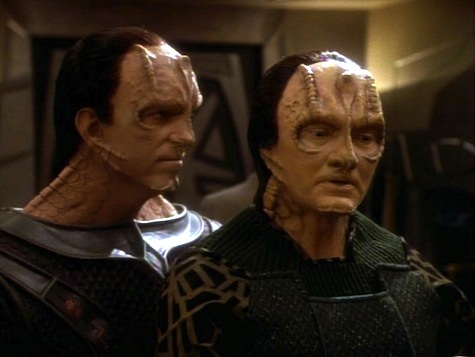
Quark pleads with Odo to release the prisoners, trying a variety of tactics that all fail, even going so far as to get down on his knees. However, Odo does agree eventually, not for Quark, but because what they’ve done doesn’t deserve a death sentence.
Unfortunately, they arrive at the cargo bay to find Garak waiting. Quark tries to stall their inevitable death at his hands, which lasts long enough for Toran to show up and make it clear that this one act of patriotism was not going to be enough to reform Garak’s reputation. Toran dismissively tells him to go back to his tailor shop.
So of course Garak shoots him. Ultimately, he’s still a patriot and he loves Cardassia more than anything, which is why he disposes of Toran and lets Lang and her students live.
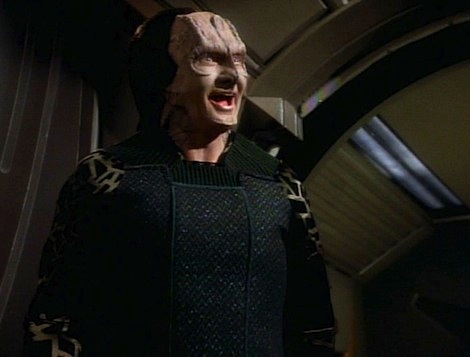
Hogue and Rekelen board the ship. Quark kisses Lang—and then she reveals that she’s going with Hogue and Rekelen. She can’t stay with him until her work is done. So all Quark has to do to get her back is to wait for Cardassia to be a free and democratic society. Piece of cake.
She goes off in the ship, and Garak and Quark walk down the cargo bay corridor, the beginning of a beautiful friendship. Or something.
The Sisko is of Bajor: Sisko gets his first real conversation with Garak, and he doesn’t hold back, making it clear that he won’t give in to Cardassian demands, even at gunpoint.
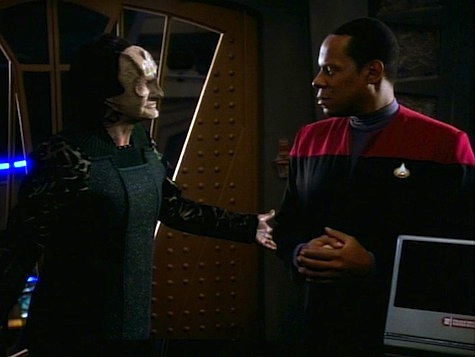
Plain, simple: We learn that Garak lives on Deep Space 9 because he’s in exile from Cardassia, though the reasons for that exile remain murky, just like most things regarding Garak.
While verbally fencing with Bashir, Garak says at one point that maybe he’s an outcast spy, which, we will eventually learn, is the actual truth, though Bashir dismisses the notion as ridiculous when he says it.
For Cardassia! The Cardassian military authority is referred to as Central Command for the first time in this episode, the term that will be used henceforth. We’re also introduced to the Cardassian dissident movement, which wishes to remove the military from power. They’ll be successful, after a fashion, in “The Way of the Warrior.”
What happens on the holosuite stays on the holosuite: Quark first installed the holosuites when he and Lang were together seven years earlier. The first program he ran was Rhymus Major, a picnic ground with waterfalls, butterflies, and birds.
Rules of Acquisition: Quark starts to quote Rule #223, but Lang cuts him off, having had her fill of hearing Rules quoted when she and Quark were dating.
Preservation of mass and energy is for wimps: O’Brien loaned a copy of I, the Jury by Mickey Spillane, the first appearance of Spillane’s most famous creation Mike Hammer, to Odo. He’s very engrossed in it when Quark interrupts him.
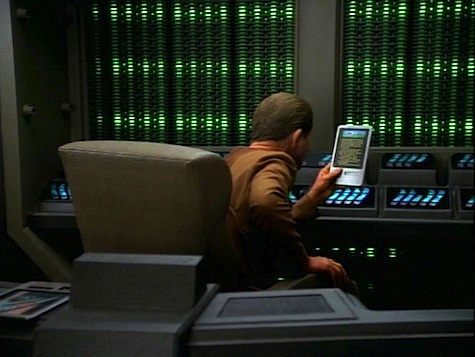
No sex, please, we’re Starfleet: Quark and Lang were a couple seven years before this episode, but it ended when he couldn’t resist being all Ferengi and stuff. But it’s obvious after she shoots him that it really is true love. Though honestly, I can’t see it lasting any longer the second time, because Lang is right: Quark would not be able to resist being a profit-hound for very long, even if it was at the expense of their relationship. He’s also willing to follow her wherever she goes if she leaves the station without him, because stalking is such a turn-on….
Keep your ears open: “Cardassians don’t involve outsiders in their internal politics, especially Bajorans.”
“Being shot at by your own people goes a little beyond politics.”
“We take our politics very seriously.”
Lang explaining the facts of Cardassian life to Sisko.
Welcome aboard: Mary Crosby—who is the aunt of Denise Crosby, Tasha Yar on TNG, and the daughter of Bing Crosby and Kathryn Crosby—played Lang. Michael Reilly Burke, having played a Borg in TNG’s “Descent, Part II,” plays Hogue (he’ll be back as a Vulcan named Koss in several Enterprise episodes), and Edward Wiley, having played a Klingon governor in TNG’s “The Mind’s Eye,” plays Toran. Plus Andrew J. Robinson returns as Garak, and Heidi Swedberg plays Rekelen.
Trivial matters: This is the only time Natima Lang appears onscreen, but she returns in the post-finale DS9 fiction as one of the prime movers behind the rebuilding of Cardassia following the Dominion War. She also appeared in the Terok Nor novels Night of the Wolves and Dawn of the Eagles by S.D. Perry & Britta Dennison, which spelled out her and Quark’s backstory mentioned in this episode, and she also appears in the Cardassia-focused novel The Never-Ending Sacrifice by Una McCormack.
The episode is very obviously patterned after the great 1942 film Casablanca, with Quark as Rick, Lang as Ilsa, Garak as Captain Renault, and Toran as Major Strasser. In fact, the original draft hewed even closer to the film, but it was toned down in subsequent drafts—including changing the title from “Here’s Looking at You…”—due to being threatened with legal action.
Lang’s favorite drink, a Samarian sunset, was first seen in TNG’s “Conundrum.”
We’ll next see the Cardassian dissident movement in TNG’s “Lower Decks.”
During the filming of the episode in January 1994, an earthquake struck Los Angeles. Several actors, including Armin Shimerman and Edward Wiley, were in the midst of having their prosthetic makeup applied, and they ran home to check on their families in full or partial Ferengi or Cardassian or whatever makeup, which must’ve been quite a sight to the already-frightened denizens of L.A.
Walk with the Prophets: “Well, some people should never be promoted.” It’s fun to see Quark as a romantic lead, as it’s not a role he would appear to be entirely suited for. Then again, nobody really thought of Humphrey Bogart as a romantic lead until Casablanca, either. And Armin Shimerman really does sell how earnest Quark is trying really hard to be—even though his instincts to do everything he can for Lang is swimming upstream against his instinct to be, well, Quark. He even comes within a hairsbreadth of trying to fleece Hogue and Rekelen for the cloaking device before he remembers that his “price” is getting to keep Lang.
It’s also nice to see that there is a Cardassian dissident movement, and it’s one we’ll continue to see throughout the series (as well as once on TNG). It’s an important step (begun in “Duet”) of making the Cardassians be more than mustache-twirling villains.
Having said that, the episode doesn’t really elevate itself beyond the Casablanca pastiche. In particular, it neuters Odo and Sisko in order to service Quark being the hero, and I just don’t buy it. The same Sisko who told Garak that he wasn’t going to take any crap from them then gives in to the provisional government? Worse, he does it off-camera? And, of course, the Cardassians don’t even hold up their end of the bargain anyhow, so the whole thing is moot.
For that matter, if Lang and the others were in prison because of the Cardassians’ deal with the Bajorans, how does Toran expect Garak to execute them? For that matter, how does Garak know to be waiting for them when they’ve been in a cell?
More fundamentally, though, if Odo’s so outraged that the three are going to be executed for no good reason, and if he’s uninterested in helping them on Quark’s behalf, why is he sitting around reading Mickey Spillane?
Also, unfortunately, mediocre acting seems to run in the Crosby family, as Mary isn’t any better than her niece: there are no real sparks between Quark and Lang, and the romance feels perfunctory and flat. Maybe it’s the Cardassian prosthetics, but Crosby does nothing to show Lang’s passion—not for Quark, not for the dissident movement.
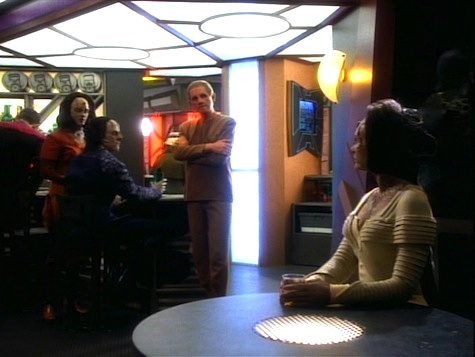
Ultimately, the problems of one Ferengi and one Cardassian don’t amount to a hill of beans in this crazy quadrant….
Warp factor rating: 4
Keith R.A. DeCandido has a new Star Trek project coming out next spring: The Klingon Art of War. Check out the first look on StarTrek.com.










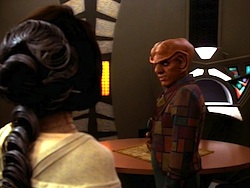
Yeah, it was interesting to see Quark’s romantic side for a change, and the Quark-Odo stuff was good as always, but this was an imperfect one. In particular, I found the Garak-Toran stuff too vague and cryptic. It wasn’t clear to me why Garak made the choice he made at the end; it felt arbitrary. It’s one thing to keep a character mysterious, but not to the point that it feels like a cover for not having any real explanation for things.
Stipulate all the criticisms, but this is a really fun episode anyways. I found the relationship between Quark and Lang to be pretty believable and to contain at least a few sparks. That’s certainly more to do with Shimerman of course. But I would never have believed that Quark could play a (serious) romantic lead and have it come off so believable. There are a few moments where you wonder ‘what’s his angle here?’ only to have it become slowly clear that he really does love her.
I particularly enjoyed watching him struggle with his instincts. He wants to be something different for her…but he doesn’t want it that much. Still, even the fact that he’s willing to consider abandoning his profit-incentives is a pretty big deal.
And even more than that, there’s the way he treats her as a genuine person, with opinions and feelings and her own universe. Now, he doesn’t do a very GOOD job of treating her like an independent person, and is definitely more stalker than sweetheart at times. But for a Ferengi, as they have been displayed so far, that’s already a pretty big deal.
All of which is to say: I strangely enjoy the ‘Ferengi Starting to Be Less Monolithic’ plots as much or more as I enjoyed the same thing when Worf was doing it with Klingon culture.
Mary Crosby, of course, also shot JR. It shows how unmemorable her performance here was that until I just read it here, I hadn’t even realised it was her.
“I saw a chance for profit, and I took it. Was that wrong?” One of my favorite lines from the series. It seems to show that profiteering is an ethical system for the Ferengi.
Heidi Swedberg, it should be noted, also played George Costanza’s long-suffering (and ill-fated) fiancée Susan Ross on Seinfeld.
Count me as another fan who can’t argue with krad’s list of criticisms but nevertheless enjoyed this episode immensely. It’s always fun to see one of the regulars operating outside of his/her comfort zone.
DSNiner: I didn’t mention that because I despise Seinfeld with every fibre of my being, and refuse to go out of my way to acknowledge that the show even existed. So there, nyah nyah. ;)
—Keith R.A. DeCandido, who’s SO MATURE!!!
krad: Thank the Prophets, someone shares my hatred of Seinfeld! Never has a comedy received such endless accolades while being so aggressively unfunny. Not even Everybody Loves Raymond.
Oh, right, the episode. I like it quite a bit, though I’m with ChristopherLBennett in finding Garak’s choice to be confusing. I know he’s all mysterious, but it felt like he shot Gul Toran because the script said so, instead of because he felt it was best.
I don’t think its the make up- Garak always has great facial expresions. Somehow I always had the impression that Garak had been waiting for an excuse to shoot the Gul for awhile.
My favorite line of the episode, and one I was sure was going to be the “Keep Your Ears Open” one:
Odo: I heard an interesting rumor today.
Quark: Only one? I started at least twelve.
Granted, that conversation only existed to Chekhov’s Gun the cloaking device, but it’s still a great example of the repartee between Odo and Quark.
I never noticed the Casablanca symmetry, but in retrospect, it’s kind of obvious. Quark wasn’t that bad as a romantic lead, but it’s kind of off-putting that the very next episode, he’s back to his philandering, flirting self.
I agree – all the criticisms are true, but man it’s fun to watch Armin Shimerman just sink his teeth into this material.
You know, I felt the same thing about Seinfeld for a long time, and while I don’t know that it deserves all the accolades it’s received, I don’t know that it deserves my completely and undying contempt either. So yeah, the Robert Knepper moment for me was watching “Susan” as a Cardassian.
Trying to do a Casablanca pastiche isn’t the worst idea and I wonder how much real threat of legal action there could have been. (Of course, they were probably a little gunshy after the Sherlock Holmes debacle on TNG.) But I also think that, if they were going to go in that direction, they might have been better off trying for a comedic take. This is just sort of half-assed and never quite clicks.
One theme that is really becoming clear here is how often a mediocre story is elevated by the quality of the regular actors. It often came up for TNG that Patrick Stewart and maybe a guest star carried an episode, but many other times the rest of the crew just couldn’t save a non-Picard focused story. It shows the much better quality of actors on DS9. Armin Shimerman, Rene Auberjenois, Avery Brooks, Colm Meaney can all bring some so-so writing to a new level and a combination makes it almost a sure thing. As time goes by, even Nana Visitor and Alexander Siddig can at least stop the bleeding.
must’ve been quite a sight to the already-frightened denizens of L.A.
I dunno, the good people of LA probably didn’t even notice. After all, it’s LA.
Only a 4? I liked this episode. But I liked any episode that featured Garak. And, like everyone else, it’s fun to see Armin Shimerman play the Romantic. He was fun channeling Kurtz in a BtVS episode, too.
@12 wiredog
As a native Angeleno who lived through the Northridge quake, I can say there is probably some truth to that. The people in the areas hard hit were likely focused on their own problems and everybody else would have already been going about their business again. If anybody did notice, they might have thought it was a rather unfunny joke, considering the circumstances. OTOH, Nana Visitor tells a story about going off the lot with her makeup on one day for lunch. Apparently, she ran into some older lady who said, “Oh, you poor dear. What happened?”
I can’t help it – this just amuses me to no end. Now I’m thinking of Quark in various Bogart roles. Treasure of the Sierra Madre actually works a little too perfectly, but Quark as Sam Spade just makes me laugh.
Some of the early Seinfeld’s aren’t that great, and most of the first season is nearly unwatchable, but the last few seasons are gold. GOLD, Jerry!
Maybe they could’ve called this one “Play it again, Sam”. People would’ve gotten the reference, and since that line doesn’t actually appear in the movie, surely there couldn’t be any legal action.
I don’t despise Seinfield, it just never made me smile let alone laugh, I am glad I am not alone in feeling no love for it.
Hakainokami @@@@@ 8 I’m with you about Garak being pleased to find an excuse to kill Gul Toran. It maybe the first time we have seen this side of Garak, but it won’t be the last if my patchy memory is right.
@8 & 16: Yes, it’s evident that Garak hated Toran and wanted an excuse to kill him, but it’s inadequately explained why he feels that way. If they’d seeded Toran as a recurring character in one or two earlier episodes, it would’ve been better, but I guess they were still feeling their way toward increased serialization like that.
@17 I felt that the mention of his exile and the scene where they first meet again adequately set him up as an old enemy. Especially with Gul Toran’s pursuit of Lang it felt like he saw an opportunity to take out an old political enemy- one that may have had something to do with his exile (since Toran implys he can end it but won’t) and ingratiate himself with the new station masters. Garak is such a mysterious character at this point (we don’t know much about him yet) that the unspoken reason for hatred felt like it just added to ‘Who is Garak really?” theme.
@18: And like I said, to me it felt like using mysteriousness as an excuse for arbitrariness.
@14: Heh, I’d love to see Quark as the lead of Stalag 17. :D
Star Trek VI established that you can’t fire a phaser on board a starship without the entirety of Starfleet running to investigate the incident. Yet
Natima stuns Quark and there’s not a peep from Security? Huh? (Yeah Odo shows up but it’s only to take Natima into custody because of the prisoner swap deal.)
Usually I feel like I agree pretty well with the reviews, but I have to say I disagreed with quite a bit this time.
First of all, I’m an unabashed Seinfeld lover here, so realizing Susan was playing a Cardassian was hilarious to me. Although, if you don’t like Seinfeld, you can also point out she was the main geek kid’s mom in Galaxy Quest :)
I actually found the episode quite good. When Toran appeared, I actually assumed Garak was stalling the entire time because he was banking on Toran showing up so he could shoot him. Whether he was doing that simply for a personal grudge, or because he truly wanted Lang and the others to escape…I don’t know…but, as this is my first time watching, right now it just seems like more pieces of the puzzle that are slowly being revealed, so it didn’t strike me as arbitrary. I definitely felt the few scenes they had earlier adequately gave some motives for this antagonism, if it WAS just a personal grudge. I guess that’s the point of his character to me – you don’t really know his motives, and maybe we never will, because his story only briefly intersects with the main character’s stories. He’s the star of his own show, perhaps, but not this one. I might not be making any sense, but…it worked for me.
I do totally agree with you here on Odo’s behavior though – I even had that same thought as I was watching it – if he actually wanted to free them, why was he sitting around reading his Kindle?
I actually really enjoyed watching Quark through this (and didn;t have any problems with Crosby’s acting) – the whole time I was waiting for the shoe to drop, but he did succeed in convincing me that maybe he did feel something for her. Do I think it would have worked long term? No, I think his love for the traditional Ferengi way of life is too strong. But I think, as best as he is able, he did love her. Doesn’t mean that I think his actions weren’t at times overly possessive or stalkerish, but, this line kind of sums it up: “I saw a chance for profit, and I took it. Was that wrong?” In his culture (regardless of what I may think of this culture, and yes, I do think there are some serious problems in that culture, at least in my view) it’s he didn’t do anything out of the ordinary or unexpected.
Also, even before I realized Susan was in this episode (I didn’t realize it until I read it here) I immediately thought of George’s “Was that wrong?” in response to Mr. Lippman confronting him about having sex with the cleaning woman on his desk in The Red Dot ;)
Quoth LeftOverBeefcake: “Star Trek VI established that you can’t fire a phaser on board a starship without the entirety of Starfleet running to investigate the incident.”
Deep Space 9 is a Cardassian station. They don’t strike me as the types who give much of a damn if weapons are fired on board the station…
—Keith R.A. DeCandido
@23: Although they were an oppressive state trying to control a rebellious population, so you’d think they’d have good reason for pervasive security sensors on their most important in-system facility. Then again, they did trash the station when they left, and perhaps repairing the more invasive security systems, e.g. the parts that monitor private quarters, has been a low priority for O’Brien.
I’m delighted to know that krad and others hate Seinfeld as much as I do. I never got the appeal of that show. It was never funny to me. Blech.
Anyhow, despite the flaws, I did like this episode quite a bit. Quark’s turn as a romantic lead is definitely fun to watch, but of course you know if Natima had stayed, it wouldn’t have worked out in the long term. Because, you know Quark is Quark. Glad he did go against the better…angels?…of his nature and help the trio at no profit beyond their safe passage off the station.
As for Garak, at this point we still knew really nothing about Garak beyond the crumbs dropped about him in his at this point few appearances, so his killing Toran simply added to the fact we know nothing of Garak’s motivations for anything.
I liked this episode, but the thing that threw me off was Lang’s turn after she shoots Quark. Crosby actually did a good job of selling me that she didn’t love Quark, so then for her to start gushing all over him was unbelievable and totally out of left field. I also found it hard to belive and lame that she accidentally shot him. I had previously been very happy about her calling him calling her bluff and actually shooting him.
Odo was also pretty casual about just letting them go, for any reason. I see Sisko in his office for hours arguing with the provisional government and pulling in whatever favors he can, and Odo just strolled into the security wing, waving goodbye and even ignoring the cloaking device that seems to be a pretty serious crime. The next person in the security office should be a Bajorian security force arresting him. And no thought to the Bajoran prisoners who were supposed to be exchanged? Sure if was a fake, but the Bajorans don’t know that and the Cardassians sure as heck won’t admit it now. For that matter, why wouldn’t a prisoner exchange work a lot easier than an ad hoc assassination?
@26, I felt exactly the same way about Lang’s confession of love. I was seriously expecting Quark to wake up on the operating table after surgery (having been shot), and realize he was only dreaming about her change of heart, and that she had escaped with the cloak. I was happy for Quark though, the way it turned out.
And I liked Seinfeld but didn’t even realize it was Cardassian-Susan in this episode. Will have to watch it again.
krad, while I respect your right to despise Seinfeld, Susan Ross is arguably Heidi Swedberg’s best-known role. What good is the Robert Knepper Moment if you don’t apply it with equanimity? ;)
In any event, I’m glad my previous post spurred so much conversation.
DSNiner: Because it’s my rewatch. So there, nyah nyah. :-p
—Keith R.A. DeCandido, who is SO MATURE!!!!!
Star Trek geeks who don’t like Seinfeld — I have found My People!
I’ve been waiting for the recap and discussion about this one, because I assumed I must have been missing something really obvious about Garak’s actions at the end. But I guess I didn’t, it was just really arbitrary and bizarre. Maybe there is some logic to it, but it was NOT made clear in the show.
I think Seinfeld is pretty spectacular. But I had no idea Rekelen was Susan.
Meh, I didn’t think much of this episode (I’m watching DS9 for the first time and reading these as I go along). I didn’t buy the Quark-Lang romance at _all._ How do you “accidentally” shoot a phaser at someone you love? Lowest setting or not?
@32: Guns go off accidentally all the time. They have no awareness of what the wielder may feel. There have been countless incidents of gun owners accidentally shooting their spouses or children or neighbors. Guns require a lot of skill and training to use safely, but there are plenty of people who possess the weapons without having the necessary skill, and that frequently leads to tragedy. Natima was a peace activist, so it’s unlikely that she had any firearm training. Which makes it not at all surprising that she fired the weapon by accident.
“I think Seinfeld is pretty spectacular.” – I see what you did there ;)
Wow, you really hate Denise Crosby’s acting. :)
I like this episode because you never expect Quark’s part in it; plus we get more Garak. Any episode with Garak is a booon.
Garak is probably my favorite guest character on the series, so I really liked this one. To me, he has as much of Rick from Casablanca in him as Quark. He acts selflessly out of patriotism and love (in this case for his world). He’s a cynic and reads people effortlessly, but has a touch of the heart of gold.
I too had an issue with Odo’s actions at the end of this episode. As has been pointed out, he seems remarkably blasé about the Injustice he perceives, and almost offhandedly agrees to make a momentous decision to release three prisoners in what appears to be direct contravention of Sisko’s orders and the demands of the bajoran government. And again, as has been the case before in the series, no consequences for disobeying orders.
As for Seinfeld, I wasn’t a big fan either, but not because it wasn’t funny. I didn’t like it for the same reason that became the basis for the final episode. All of the main characters were self-centered jerks with no sense of empathy. In short, they were all bad people and I found myself with no one to root for. And after a while, even though I found some of the humor to be brilliantly edgy and ironic, I just could not devote any more attention to a show where I disliked every single character every single week.
Garak’s motivation seemed obvious to me, so now I wonder if I didn’t miss something. He had just been mocked by his Gul rival, and betrayed – told that the promised reprieve and return to Cardassia was not in the cards, whatever he did. So while he had been ready to shoot the prisoners to secure his return, without that plum he took the next-best thing: eliminating an opponent. Note that he gave the murder weapon to one of the students as they departed – Garak walked away from this with one fewer enemy and no indication that he had done the deed.
His alternative was to let Gul Toran kill the rebels and gain the credit, strengthening Toran and humiliating Garak.
Easy choice, surely.
Count me as another Trek-lover who never really understood the appeal of Seinfeld.
Also, I realize I’m a couple years late here, but in response to LeftoverBeefCake @@@@@ 21 (and KRAD @@@@@ 23, CLB @@@@@ 24), re: firing a phaser on the station, and the conspicuous lack of alarms:
While your explanations make sense, and could indeed explain the lack of alarm, no “Cardassian Station” handwaving is necessary in this case. What TUC established was that one could not fire a phaser on the “vaporize” setting without setting off alarms. During the search for the boots, Chekhov asks why the culprits wouldn’t simply vaporize the boots. Valeris demonstrates by vaporizing the mixing pot in the mess, setting off the alarms all over the ship. Later on, when Burke and Samno have been murdered by a “Phaser on stun at close range” (note, there was no indication that alarms went off for those phaser blasts, they were only found later), McCoy, having been off ship for the previous conversation, asks why they weren’t vaporized. Chekhov matter-of-factly responds, “Would set off the alarm.” It seems to me that the alarm is only activated in the event of a phaser being fired on the highest setting (assuming that “Vaporize” is, indeed, the highest setting). In this case, Lang couldn’t have had the phaser on that setting, since Quark clearly survived the incident.
I just rewatched this episode, and one thing bugged me that I hadn’t paid attention to before: the deal to exchange Bajoran prisoners for the Cardassian dissidents. Wasn’t it established in “The Homecoming” that Cardassia wasn’t supposed to have any Bajoran prisoners anymore? And that the mere existence of such prisoners was a huge diplomatic embarrassment to them? So how come in this episode the revelation that there are even more prisoners is treated like business as usual by Cardassia, Federation, and Bajor all alike?
@39: There were Bajoran splinter groups that continued to wage war on Cardassia even after the Cardassians withdrew from Bajoran space (one such group called the Kohn-Ma was referenced in the first season episode Past Prologue), so maybe the Bajoran prisoners were members of the Kohn-Ma or one of the other splinter groups who were caught operating in Cardassian territory after the Cardassians pulled out of Bajor.
Crazy theory: When Lang shoots Quark, he’s actually unconscious for quite a while. The rest of the episode was just Quark’s coma-dream.
Could have been much better. At the end, it was clear that Garak wouldn’t capture or even kill the dissidents. Why Odo all of a sudden decided to release the prisoners wasn’t really made clear either. As already pointed out in the review, if he cared so much about justice why does he sit around doing nothing?
38. JamesP is correct, it was clearly vaporizing that was the alarm trigger, not merely firing a phaser. Most of The Undiscovered Country was clear about that. I say most because after Valaris vaporizes the mixing bowl she says something to the effect of: “As you know, noone can fire a unauthorized phaser aboard a starship.” strangely omitting the vaporize stipulation.
I got the impression Garak killed Toran because he was an incompetent officer, someone unworthy of being a Gul. Garek seemed pretty flabbergasted when he found out that Toran had been promoted. However, as someone who professed to love Cardassia, three dissidents would seem to be more of a threat to the future of Cardassia than one substandard Gul; so the confusion persists…
Lockdown rewatch: Fair main review, the only thing that makes this episode watchable is the Garak stuff which in general make most things watchable although Armin Shimerman tries his best with the material he’s given.
@39 That was my son’s exact comment at the end of the episode. I sort of said the same as @40, that it was new prisoners taken since the occupation ended, but some clarity would have helped.
I also thought people were being hard on Quark. We see him hit on anything with a pulse and act the real lothario most of the time. Here he really seemed to be in love – which is going to look strange as it would through the Ferengi lens which doesn’t envision such relationships with females at all.
And I don’t get what everyone is talking about with Garak, he’s just a simple tailor
Regarding whether Cardassia has Bajoran prisoners, it’s clear that they play all kinds of definitional games with the term. Kai Winn runs into this negotiating for Bajor in a later episode. So new prisoners from groups that never accepted the peace, Maquis collaborators, could be any number of things.